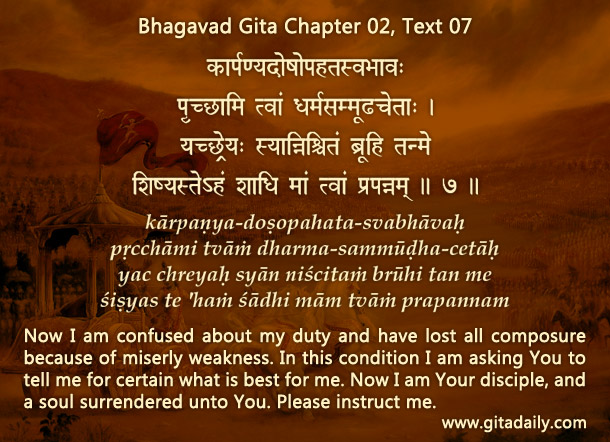The Bhagavad-gita is God’s song as indicated in its very name. But it is a distinctive kind of song because its poetic verses answer Arjuna’s philosophical questions. Indeed, the entire Gita can be considered to be a question-answer session wherein Arjuna raises seventeen questions and Krishna answers them.
More precisely, the Gita can be analyzed as a nested question-answer session wherein Arjuna’s first question drives and defines the entire discussion. What about Arjuna’s subsequent questions? They arise within Krishna’s answer to Arjuna’s first question and are addressed within that answer. Thus, Arjuna’s first question is of paramount importance. What is that question? Essentially, it is: what is dharma? (02.07)
Dharma here refers not to religion, but to ‘the right thing to do’. This meaning is evident from the context: Arjuna is bewildered about what to do: to fight or to not fight. In the previous verse (02.06), he articulates his confusion. And in the next verse (02.08), he asserts the emptiness that will haunt him even if he fights and succeeds. Intriguingly, the Gita’s driving question is also the Mahabharata’s driving question — the whole epic is narrated in response to the inquiry: what is dharma?
Significantly, Arjuna doesn’t restrict his question to his specific situation; he doesn’t ask, “Should I fight or not?” or even “What is my dharma?” By phrasing his question in universal terms — what is dharma? — Arjuna paves the way for Krishna to share timeless wisdom. Reciprocating with Arjuna’s mood, Krishna doesn’t get into the ethics of the Kurukshetra battle. Instead, he addresses universal questions about the meaning and purpose of life, thereby providing all of us a compass for dealing with whatever dilemmas we may confront during our life-journey.
One-sentence summary:
The universal nature of Arjuna’s question opens the door for Krishna to provide wisdom that transcends Arjuna’s specific context and speaks to all of humanity in its countless contexts.
Think it over:
- In the Gita, why is Arjuna’s first question especially important?
- In Arjuna’s first question, what does dharma mean? Why?
- What is significant about how Arjuna phrases his first question?
***
02.07: Now I am confused about my duty and have lost all composure because of miserly weakness. In this condition I am asking You to tell me for certain what is best for me. Now I am Your disciple, and a soul surrendered unto You. Please instruct me.
To know more about this verse, please click on the image


Leave A Comment